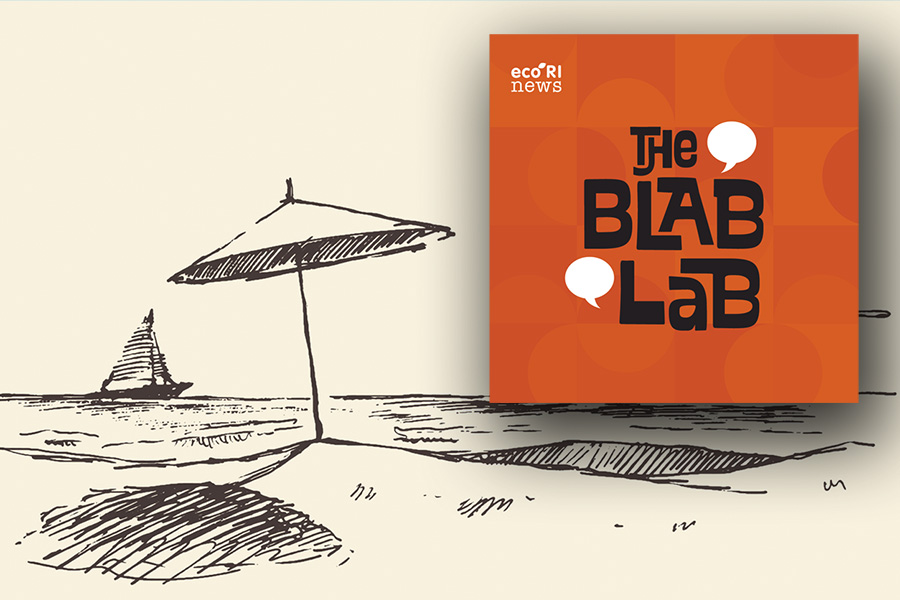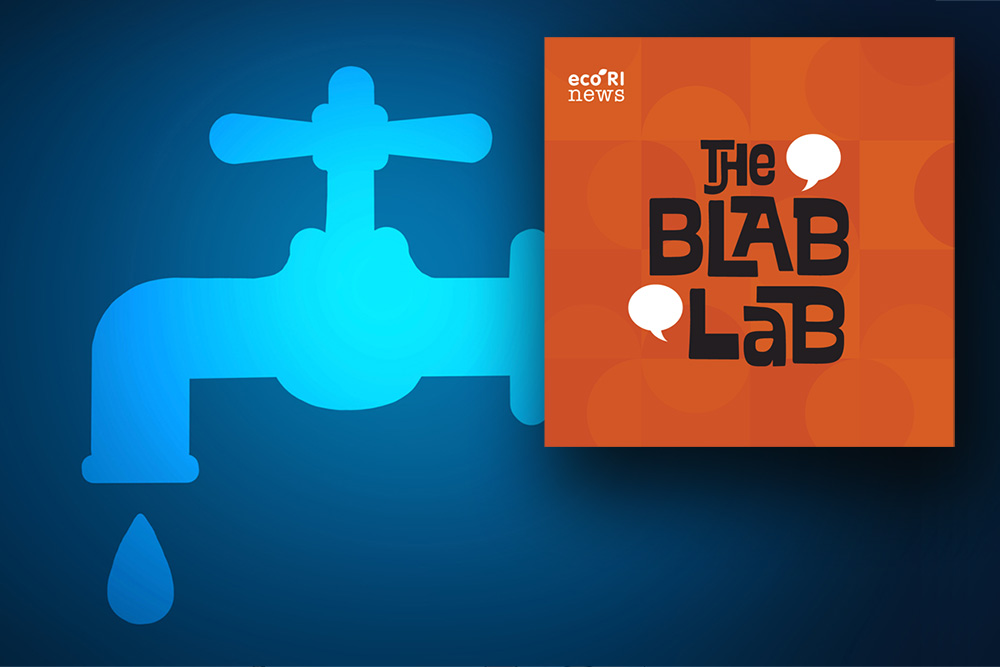Cruise Control
August 17, 2023
Avast! Trash overboard! In this episode, ecoRI News reporters Frank Carini and Colleen Cronin navigate the dark and environmentally deleterious underside of the cruise ship industry.
Subscribe and listen on iTunes, Spotify, or wherever you get your podcast.
This transcript was edited for clarity and length.
Colleen Cronin
Welcome to the Blab Lab, a twice-monthly podcast from the reporters of ecoRI News, where we unpack the critical environmental issues facing southern New England. I’m reporter Colleen Cronin, and today I’m here with senior reporter and columnist Frank Carini to talk about his recent piece on the environmental impacts of cruises. Hey, Frank, how you doing?
Frank Carini
Good. Obligated to be here.
Colleen Cronin
I did make Frank wait an extra half an hour accidentally because I was getting carsick on an electric school bus this morning.
So Frank, in this piece, you talk about the many ways cruise ships are tough on the environment. And I was wondering if we could start with some of the audacious acts you mentioned in the article — that Carnival Cruise Lines has several environmental violations. And I’m wondering if you could talk about how you found those out and what they were?
Frank Carini
Yeah, finding out was easy, because there’s a list by Friends of the Earth keeps to track cruise ships and all their violations. And you can find the court cases, but the court case you were talking about, that was the biggest one; it’s actually the biggest in history. It was a $40 million fine to Carnival in 2017 for deliberately dumping hazardous chemicals and oil into the oceans. Deliberately, at least according to the court records, because on these cruise ships, you’re incinerating the trash, all the wastewater and sewage is being treated or minimally treated, or partially treated, allegedly treated before it’s dumped into the ocean. So there’s no space to keep any of this stuff. So like I said, burning it or dumping it is the only option. And they just decided to dump a bunch of stuff; how they got caught, I have no idea.
Colleen Cronin
So some of the stuff they’re legally allowed to just dump in the ocean, but it has to go through some sort of remediation.
Frank Carini
Yes, like a sewer system on board. Now, some of them, they don’t always work, and it’s nobody’s fault. It could have broken down, and they didn’t know. But then sometimes it’s deliberate.
Colleen Cronin
I’ve never been on a cruise before. I’ve only ever seen them from a distance. You’re talking about some pretty big ships.
Frank Carini
Yeah, they’re massive. And most of them still are fueled by something called heavy fuel, heavy fuel oil. It’s basically just the dregs of refinery stuff. Reports show that for one cruise ship, every day at sea, it emits the same amount of sulfur oxides as a million cars. I came across a CNN puff piece about the Icon of the Seas, which is going to be unleashed in January. This will be the biggest cruise ship that’s ever sailed. It’s 1,200 feet long and weighs 251,000 tons. And it has 20 decks, and it holds 7,600 passengers, plus 2,300 crew. The CNN puff piece noted it’s going to be “clean energy” because it runs on liquefied natural gas.
Colleen Cronin
So, it’s cleaner, but not really.
Frank Carini
Yeah, it’s cleaner than the heavy fuel oil. Sure.
Colleen Cronin
I was kind of amazed how big these things are. And also their equivalency to cars and how much toxins they emit. So can you talk a little bit about what kind of waste and byproducts these ships are putting out?
Frank Carini
For example, there’s no bubblers or drinking fountains, or whatever you want to call them.
Colleen Cronin
Scuttlebutt.
Frank Carini
Yeah, what’s that?
Colleen Cronin
It’s the name of a bubbler on a ship.
Frank Carini
Really?
Colleen Cronin
Yeah. And then it became the word for gossip, because scuttlebutt is what you talk about when you’re by the bubbler.
Frank Carini
Wow. Well, anyway, there’s no scuttlebutts on the ships for health reasons. They’re all just basically a big petri dish. In case you’ve guessed, I’ve never been a cruise obviously. Nor would I ever.
Colleen Cronin
I mean, the man who doesn’t like to go to the beach during the summer doesn’t want to be on a cruise? Shocking!
Frank Carini
Even back in the day when I was young and would hoist a few adult beverages and like to, you know, party or whatever.
Colleen Cronin
Who knew Frank used to party?
Frank Carini
So, anyway, there’s no bubblers or scuttlebutts, and so everybody’s drinking water out of plastic bottles, and all those bottles have to be incinerated. All the trash has to be incinerated.
And we didn’t talk about the people and the buffets; obviously people take more than they can eat, so there’s all that food waste, and then that’s burned or dumped at sea. I mean, granted, that’s not as bad as dumping plastic and burning plastic, but still.
Even if these ships are totally within all legal requirements, there’s still all that noise and propeller pollution. In 2001, a cruise ship hit a pregnant humpback whale off the coast of Alaska. Passengers and some of the crew were telling the pilot or whatever they call the person who drives the boat.
Colleen Cronin
Captain.
Frank Carini
Yeah, whatever, the captain, engineer whatever.
Colleen Cronin
You’re not showing your nautical knowledge.
Frank Carini
I don’t have much nautical knowledge. But anyway, they were on a collision course with this whale, and the boat never even changed speed. So, it just slammed into the whale and got fined. $750,000. So even on its best day, cruises are still creating a lot of environmental damage.
Colleen Cronin
Frank, you mentioned scrubbers as one of the greener things, if you can call it that, these ships are doing. What are they?
Frank Carini
Scrubbers are on the smokestacks, and they suck out all the pollutants before they are released in the atmosphere. And that’s great. But then all the stuff that they’re scrubbing, instead of being spewed into the air, it’s getting dumped into the waters. That’s what happens to a lot of it. So, it’s either polluting the air or polluting the water.
Colleen Cronin
Are there any ways that these companies are trying to be greener?
Frank Carini
I think they’re moving to liquefied natural gas or liquefied propane rather than heavy fuel oil, but I didn’t find anything where they’re going to go solar.
Colleen Cronin
But has there been any legislation to try to clamp down?
Frank Carini
No, I couldn’t find any. But that doesn’t mean it isn’t out there. Or people are not talking about it. But no. The reports I did find are critical of the industry; it’s largely unregulated.
Colleen Cronin
Because a lot of the companies aren’t based in the United States.
Frank Carini
Yes, they’re based in Africa or the Caribbean, so they’re not really paying federal taxes, at least not to the United States. So no, they’re not well regulated anywhere on the planet. And that’s the big problem.
Colleen Cronin
I’m also wondering if, because they’re operating in international waters, if that has anything to do with it being kind of like the Titanic submarine that wasn’t really regulated. Like, it seems like a little bit like the Wild West out there.
Frank Carini
This year there were 98 cruise ships scheduled to anchor in Newport. I talked to DEM and in the city of Newport there’s not like a lot of things they do to regulate. I mean, they can make sure they can’t dump their wastewater and the DEM said they’ve never had a problem with that. But I mean, why would they come into a port and then dump their wastewater? They just do it when they’re at sea.
Colleen Cronin
It’s probably more noticeable at port.
Frank Carini
Yeah. But even if they’re docked in Newport, they leave these ships running. They’re idling because some passengers might not disembark. Also, they don’t want the ice-skating rink that’s on the ship to melt, and so they need to keep idling. It’s insanity all this stuff these ships have: 40 entertainment venues, bowling alleys, a skating rink, restaurants, bars.
Colleen Cronin
It’s like a floating city.
Frank Carini
I mean, how do they even stay afloat?
Colleen Cronin
Obviously don’t know how buoyancy works. You didn’t know the bubblers were called the scuttlebutt on a boat!
Frank Carini
No, I never heard of scuttlebutt before.
Colleen Cronin
Why did you decide to write about this if you are not an avid cruiser —if that’s what people who take cruises are called?
Frank Carini
I was in Newport last fall, and an ecoRI News reader mentioned that all these cruise ships that come into Newport, and I hadn’t really given it much thought. But that stayed with me. Then I saw the CNN puff piece about the Icon of the Seas, and I was like, “Wow, this is an environmental disaster.” Then I started poking around and came out with the story.
Colleen Cronin
Well, thanks for being here. Frank.
We want to thank Vanessa Carlton for letting us use her song “Willow,” which you hear at the beginning and end of every episode, we also want to thank Roger Williams University and Professor Bernardo Motta for letting us use the recording studio. Thanks also to Jo Detz, our publisher, for editing and mixing the episode. If you have any questions, tips or podcast ideas email me at [email protected] Until next time, you can read more Rhody environmental news at ecoRI.org.
Categories
Join the Discussion
View CommentsYour support keeps our reporters on the environmental beat.
Reader support is at the core of our nonprofit news model. Together, we can keep the environment in the headlines.
We use cookies to improve your experience and deliver personalized content. View Cookie Settings



